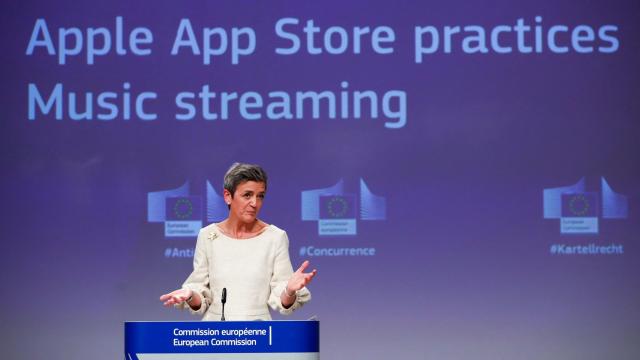Apple’s App Store — and its so-called “Apple tax” — have been at the centre of several recent lawsuits. In the latest development, the European Union has charged Apple with allegedly “abus[ing] its dominant position” in the music streaming market.
The charges stem from an initial complaint filed by Spotify in 2019. At the time, Spotify accused Apple of having “an unfair advantage at every turn” by imposing a series of obstacles that favoured its own services at the expense of competitors. As it turns out, the European Commission seems to agree with Spotify.
“By setting strict rules on the App Store that disadvantage competing music streaming services, Apple deprives users of cheaper music streaming choices and distorts competition,” the European Commission said in a tweet.
The Commission further explained in a press release that it took issue with Apple’s role as a gatekeeper to the iOS ecosystem. Because the App Store is the only venue for developers to reach iOS users, the Commission contends that elevates Apple to a dominant position within the music streaming market. In particular, it singled out Apple’s mandatory 30% commission for in-app purchases and “anti-steering provisions.” The latter refers to limitations within the App Store that prevent developers from informing consumers of alternative payment options that might be cheaper. That in turn forces rival music streaming services to raise subscription prices for consumers to make up for their higher costs — all while Apple benefits by acting as a middle man for in-app billing and communications with consumers.
Needless to say, both Spotify and Apple have differing opinions on the EU’s preliminary findings.
“Today is a big day,” Spotify CEO Daniel Ek said on Twitter. “Fairness is the key to competition. With the @EU_Commission Statement of Objections, we are one step closer to creating a level playing field, which is so important for the entire ecosystem of European developers.”
“Ensuring the iOS platform operates fairly is an urgent task with far-reaching implications,” echoed Horatio Gutierrez, Spotify’s head of global affairs and chief legal officer, in a statement to Gizmodo. “The European Commission’s Statement of Objections is a critical step toward holding Apple accountable for its anticompetitive behaviour, ensuring meaningful choice for all consumers and a level playing field for app developers.”
In an official statement sent to Gizmodo, Apple zeroed in on Spotify wanting a “free ride” despite its success as the world’s largest music subscription service. “At the core of this case is Spotify’s demand they should be able to advertise alternative deals on their iOS app, a practice that no store in the world allows,” the statement reads. “Once again, they want all the benefits of the App Store but don’t think they should have to pay anything for that. The Commission’s argument on Spotify’s behalf is the opposite of fair competition.”
Apple also said that Spotify doesn’t pay commissions on 99% of its paid subscriber base and that it reduced its commission rate to 15% after the first year. It also noted that Spotify isn’t required to pay any commission for its ad-supported users, and pointed to the company’s numerous ads on multiple media platforms as evidence that consumers are well-informed of out-of-app offers. This defence isn’t new; many of the points here echo Apple’s public statement in 2019 regarding Spotify claims.
It’s a no-brainer that each company would point to the other as being in the wrong here. But it’s clear that Apple’s 30% commission and control over in-app transactions is a sore point for multiple companies. Next week, Epic Games will also go to federal court to argue that Apple abused its power to kick Fortnite out of the App Store. That dramatic brouhaha last summer sparked a number of app developers — including Spotify, Tile, and Epic Games — to form the Coalition for App Fairness (CAF), a nonprofit that aims to fight against the so-called Apple tax and other anticompetitive app store policies.
To clarify, the EU’s announcement today is just preliminary. Apple will now get the chance to rebut the charges before the Commission makes a final ruling. These particular charges are also focused on music streaming, though according to the Verge, the Commission has also expressed an interest in looking into Apple’s gaming policies in the App Store. If found guilty, Apple could face up to a 10% fine on its annual revenue — which, any way you slice it would be a lot of money. However, the Commission says that there are “no legal deadlines for bringing an antitrust investigation to an end” and that an investigation will last as long as it needs to, “depend[ing] on a number of factors.” In other words, while this is a major milestone in Apple’s App Store antitrust saga, it’s far, far, far from being over.
Update, 4/30/2021, 10:45 am: Spotify official statement added.
